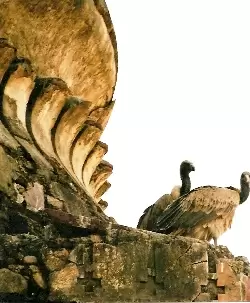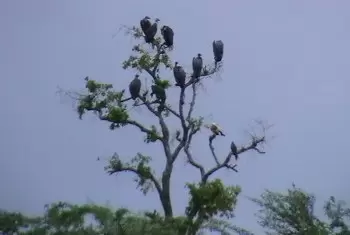Diclofenac use in veterinary drugs has led to the depletion of Asian vulture population

03-May-2012
Vol 3 | Issue 18
From being one of the most common raptors in India, the Asian vulture population has been declining at a faster pace than any other bird species, placing them on the critically endangered species’ list.
According to the recently published research paper by Pune-based NGO Ela Foundation and the National Institute of Virology (NIV) in 2011, the population of two species of vultures, the Oriental white-backed vulture and the Long-billed vulture Gyps indicus, have declined by more than 90% across India.
 |
|
Vulture population may be fast declining, but there is Dilsher Khan to save them
|
A number of reasons have been attributed to their decline such as electrocution, food shortage, the rampant use of diclofenac (a non-steroidal anti-inflammatory drug) in veterinary medicine, malaria, pesticide poisoning and a lack of nesting sites.
Under a government’s directive, as per the Gram Swachata Abhiyan, livestock carcasses cannot be left unattended and have to be buried in order to keep the villages clean and prevent the spread of diseases.
This had led to a severe food shortage for vultures. Diclofenac poisoning is also believed to be one of the major causes of vulture deaths.
Although banned in India, the drug is still being used by farmers to treat livestock. Vultures that feed on livestock treated with diclofenac are afflicted with a disease called Gout, leading to organ dysfunction, and eventually death.
Among the many Gypsophils (Vulture Enthusiasts) is a man in a remote town in Satna, Madhya Pradesh, who is fighting a lone battle to save vultures.
Forty-three-year-old Dilsher Khan, a welder by profession, who has been manufacturing agricultural tools, has been a lover of birds and nature since his childhood.
A post-graduate with an MA degree, he travels extensively around villages spreading awareness regarding the risks of using diclofenac on livestock.
"A railway line runs behind my house and very often cattle get run over and it is common sight to see vultures feeding on the carcasses," said Khan.
Since 1996, Khan said he began noticing a decline in the number of vultures scavenging on carcasses.
In 2002, he began to seriously monitor the vulture population and sadly noticed that their numbers had indeed declined significantly.
Since then, he has been trying to reach out to various organizations to better understand the reasons for the decline and launch necessary efforts to rescue them.
Having monitored them for almost 10 years now, Khan says he has become accustomed to their usual breeding spots, which are usually nestled in the hills, far away from human settlements.
His mission includes educating villagers about the long term dangers of using diclofenac, with the help of photographs and documentaries.
He says, "When I tell villagers about the ecological disturbances caused by the use of a single injection, they seem to understand the potential danger and agree to stop using them." But he is also aware that with the lack of an effective alternative, they eventually resort to using diclofenac to save their cattle.
Khan also noted that human interference is a major hindrance to vulture breeding.
He says, "In Orissa, dark, caved-in structures inside ancient temples are popular sites for vulture nesting. But the archeological department’s efforts to clean the premises to restore their glory have led to the relocation of vultures to new sites, often harming them in the process."
.webp) |
|
Dilsher wants to fight for the cause no matter what it costs him
|
Khan says he has received very little scientific guidance and financial support for his work. Even major organizations which are financially sound have either refused to help him or they offer very little help.
He has been pumping money from his small-scale business to sustain his cause.
The biggest hurdle he says, "is meeting the expenses related to traveling to different villages." But he vows to never stop fighting for this cause no matter what it costs him.
His dream is to open a "vulture restaurant" (feeding facility) for which he even sent a letter to the authorities, which was promptly rejected.
He also proposed the opening of a vulture feeding center in Ram Nagar, which was also shot down. But, despite these drawbacks, he has never lost hope and continues to do his best to help his best friend, the vulture.
Khan says his biggest support is his wife, who accompanies him to various villages and is an avid photographer herself.
On March 20th, on the occasion of World Sparrow Day, Nashik-based Nature Forever Society recognized Khan's efforts and conferred upon him the Sparrow Award for 2012.
Mohammed Dilawar, founder of Nature Forever Society, says "I first met Dilsher Khan six years ago when I visited Satna on a Bombay Natural History Society project. I was impressed that someone from a small town with little access to modern amenities and infrastructure was selflessly working to save these birds from imminent extinction."
Vulture extinction has been a cause of serious concern not only among environmentalists but even humans. With vultures vanishing, it will take much more time for the disposal of carcasses, raising health concerns. Feral dogs have replaced vultures in many areas.
The vultures play a vital role in the funeral ceremonies of Parsis. Their religion forbids them from burying or cremating their dead since they believe that earth, water, air and fire are sacred elements.
 |
The corpse is carried to the "Towers of Silence" and placed on a marble slab for vultures to feed on. But with the rapidly declining vulture population, the towers have remained silent.
But there is some hope with the discovery of a new drug that can work as an alternative to diclofenac. Meloxicam, a drug that is similar in constitution to diclofenac but is relatively less harmful, has recently entered the market for veterinary use in India. It can be easily used in place of diclofenac.
It is important that all States launch Captive Vulture Breeding Programs.
The Vulture Care Center in Pinjore, Haryana, has already proved to be successful. The launch of "Vulture Restaurants" in Maharashtra and Punjab has also helped promote diclofenac-free meat for vultures.
At these restaurants, animal carcasses are bought from villagers and placed on brick platforms. The locations have been selected to provide the birds with not only a safe place to eat, but also to roost and breed.
Some environmental experts are skeptical about this effort because vultures are wild and may also end up consuming food elsewhere which might not be free from poisonous substances, thus defeating the whole purpose of the restaurant.
But, such simple experiments are definitely a reassuring step towards saving vultures. Says Dilawar, "In a country obsessed with tiger-centric conservation, people like Dilsher Khan provide a beacon of hope for vultures that may soon end up only in memories and textbooks."
Published below is a Letter to the Editor from Atul Sathe, Public Relations Officer, Bombay Natural History Society, Mumbai:
This is with reference to the recent article on your website titled “Diclofenac use in veterinary drugs has led to the depletion of Asian vulture population”. As you may be aware BNHS has been doing pioneering work in vulture conservation in India over the past decade. BNHS has been successfully running three Vulture Conservation Breeding Centres in Pinjore (Haryana), Rani (Assam) and Buxa (West Bengal) with the help of UK-based Royal Society for the Protection of Birds and the respective state forest departments. BNHS has also been conducting nation-wide scientific surveys to assess the situation of vultures, have been advocating for vulture conservation at various levels and had played a key role in getting diclofenac banned for veterinary use.














